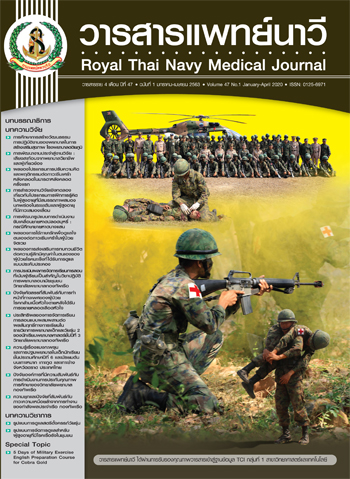The Effect of Using Love Language for Taking Care of Oneself on Depression among Psychiatric Patients
Main Article Content
Abstract
This research was quasi experimental research to study the effects of using love language to take care of oneself on depression in psychiatric patients. Sample included seventy-two psychiatric patients with mild to moderate depression, aged 15-59 years, and was admitted for receiving treatment in hospital. Samples were divided into an experimental group and a control group, using matching and simple random methods, 36 people each group. The experimental group received a love language, while the control group received routine care. Research instruments consist of love language to take care of oneself, 9Q and HRSD depression measurement form. Data analysis was performed using frequency, percentage, mean, standard deviation and compare depression with t-test. Result found that 61.11% were female, 38.89%, age 21 - 30 years (M = 32.53, SD = 12.63), single marital status 75%, secondary education/vocational certificate 50%, employment/farmers 27.78%, average monthly income 15,585 baht (SD = 20,985.89, Min = 0, Max = 100,000, Median = 9,000), illness period is less than 6 months 36.11%, admitted in the hospital for the first time 52.78%, diagnosed with depression and schizophrenia equal proportions 41.67%. The samples in both groups have no different personal information characteristics. The results revealed that after received love language, the experimental group had depression level (9Q : M = 4.22, SD = 3.86, HRSD : M = 10.08, SD = 5.54), lower than before the experiment (9Q : M = 12.97, SD = 3.90, HRSD : M = 16.56, SD = 5.15) (p < .05) and after the experiment, the experimental group had depression (9Q : M = 4.22, SD = 3.86, HRSD : M = 10.08, SD = 5.54) lower than the control group (9Q : M = 7.03, SD = .5.97, HRSD : M = 12.72, SD = 5.38) (p < .05). Suggestions that love language are effective for reducing depression. Professional nurses and related persons should support the care of their own hearts by using love language in psychiatric patients with depression.
Article Details

This work is licensed under a Creative Commons Attribution-NonCommercial-NoDerivatives 4.0 International License.
References
World Federation for Mental Health. Depression: a global crisis in 2012. [Internet]. [cited 2016 May 27]. Available from: https://www.who.int/mental_health/management /
depression/wfmh_paper_depression_wmhd_2012.pdf.
Department of Mental Health. Report of patients coming to service, report of patients to receive psychiatric services, picture of the whole country. [Internet]. [cited 2017 December 18]. Available from: https://www.dmh.go.th/report/datacenter/map/. (in Thai).
Pinikahana J, Happell B, Keks NA. Suicide and schizophrenia: a review of literature for the decade (1990-1999) and implications for mental health nursing. Issue in Mental Health Nursing 2003;24(1):27-43. (in Thai).
Somdet Chaopraya Institute of Psychiatry, Information Center. Patient Statistics. Bangkok: Somdet Chaopraya Institute of Psychiatry; 2019. (in Thai).
Chapman G. The 5 love languages: the secret to love that lasts. Chicago: Northfield Publishing; 2015. p. 35-87.
Gareis E, Wilkins R. Love expression in the United States and Germany. Int J Intercult Relat 2011;35(3):307-19.
Akwarangkoon S, Noonin N, Chansamran W. Volunteer development for children and youth to care for the elderly with depression in the community. Nakhon Si Thammarat: School of Nursing, Walailak University; 2017. (in Thai).
Olaya B, Moneta MV, Koyanagi A, Lara E, Miret M, Ayuso-Mateos JL, et al. The joint association of depression and cognitive function with severe disability among community-dwelling older adults in Finland, Poland and Spain. Exp Gerontol 2016;76:39-45.
Fishleder S, Gum AM, King-Kallimanis BL, Schonfeld L. Trajectories of depressive symptoms in community-dwelling older adults: a six-month longitudinal study with monthly assessment. J Affect Disord 2016;198:171-7.
Koolnaphadol P. An enhancement of family quality of life through love language program. Journal of Education Measurement Mahasarakam University 2017;22(2):233-46. (in Thai).
Yalom ID. The theory and practice of group psychotherapy. 4th ed. New York: Basic Books; 1995.
Hamilton MA. A rating scale for depression. J Neurol Neurosurg Psychiatry 1960;23:56-62.
Lotrakul M, Sukanich P, Sukying C. The reliability and validity of Thai version of Hamilton Rating Scale for Depression. J Psychiatr Assoc Thailand 1996;41:235-46. (in Thai).
Lotrakul M, Sumrithe S, Saipanish R. Reliability and validity of the Thai version of the PHQ-9. BMC Psychiatry 2008;8:46:1-7. (in Thai).
Cohen J. A power primer. Psychological Bulletin 1992;112(1):155-9.
Kongsuk T, Arunpongpaisal S, Janthong S, Prukkanone B, Sukhawaha S, Leejongpermpoon J. Criterion-related validity of the 9 questions depression rating scale revised for Thai central dialect. J Psychiatr Assoc Thailand 2018;63(4):321-34. (in Thai).
Department of Mental Health. Guidelines for managing depression for general practitioners in primary and secondary care. Department of Mental Health; Ministry of Public Health; 2010. (in Thai).
Park KM, Park H. Effects of self-esteem improvement program on self-esteem and peer attachment in elementary school children with observed problematic behaviors. Asian Nursing Research 2015;9(1):53-9.
Reiner I, Bakermans-Kranenburg MJ, VanIJzendoorn MH, Fremmer-Bombik E, Beutel M. Adult attachment representation moderates psychotherapy treatment efficacy in clinically depressed inpatients. J Affect Disord 2016;195:163-71.
Pananakhonsab W. Migration for love?: love and intimacy in marriage migration processes. Emotion, Space and Society 2019;31:86-92.


